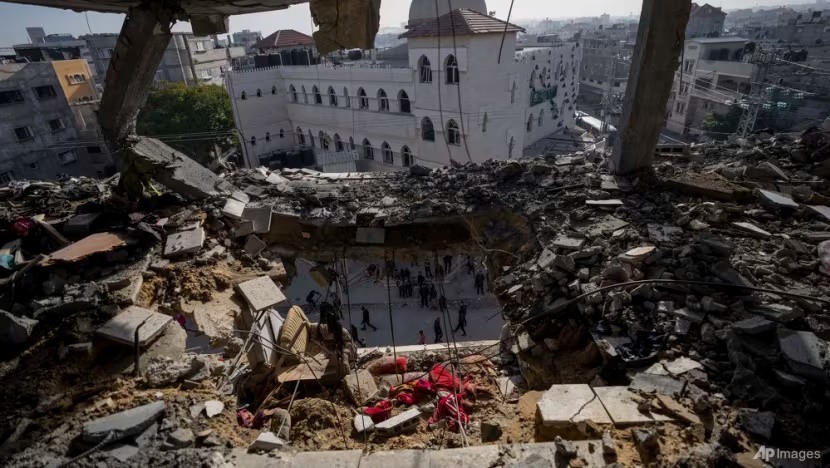After 100 Days, Israel-Hamas War Threatens to Spill Beyond Gaza, Disrupt Global Trade

After 100 days, Israel’s war with Hamas is turning into a protracted conflict with no clear end, threatening to spread across the Middle East, disrupt global trade and bog down the U.S.
One of the biggest geopolitical events this century, the war has swung from a Hamas attack on Oct. 7 that Israel says killed 1,200 people to the Israeli military’s ferocious retaliation against the militant group in Gaza.
More than 23,000 Palestinians have been killed, mostly women and children, Palestinian authorities say, a number that doesn’t distinguish combatants from civilians, and nearly 70% of Gaza’s 439,000 homes and about half of its buildings have been damaged or destroyed.
The U.S. has come to Israel’s aid in a war that poses one of the defining foreign-policy tests for President Biden. The conflict and the administration’s staunch support for Israel have reverberated in U.S. domestic politics, sparking a wave of protests at college campuses and adding fuel to the culture wars just as the president heads into a contentious election.
The Gaza conflict has forced the U.S. to refocus on the Middle East after years of redirecting diplomatic and military resources to counter a rising China. It has distracted from U.S. efforts to help Ukraine beat back Russia’s invasion.
The conflict has scrambled one of Biden’s top foreign-policy priorities: U.S.-backed normalization talks between Israel and Saudi Arabia that were meant to reshape diplomatic and security alliances in the region and help contain Iran. With tensions high between the U.S. and Arab countries, it is unclear how and when the U.S. will be able to resume those talks, which have been suspended.
Now, the question of how to solve the Israeli-Palestinian conflict, for years largely ignored by the international community and Israel, is again central to global diplomacy—though the pathway to a two-state solution appears rockier than ever.
“Everyone thought the region was humming along,” said Sanam Vakil, deputy director of the Middle East and North Africa program at Chatham House, a London think tank. There was “this mirage that the Palestinian issue could be sidestepped,” she said.
When and how Israel decides to end the war is likely to have a bearing on multiple fronts—including its own long-term security.
Beyond the Gaza battlefield, the U.S. is working on containing Hamas’s backer Iran and its allies, including Lebanese Hezbollah and Yemen’s Houthis. A fragile peace process in Yemen, which the U.S. helped broker and is a centerpiece of a recent rapprochement between Saudi Arabia and Iran, is now at risk.
The U.S. and its allies conducted strikes against Houthi targets in Yemen this weekend in response to attacks in the Red Sea that have caused ships to make costlier journeys and rattled commodities prices tied to those flows.
“When a war in Gaza spills beyond Gaza, beyond Israel, into the region, which is now happening,” said Hugh Lovatt, a senior policy fellow with the European Council on Foreign Relations, “that’s when you have global repercussions.”
The strikes elevated U.S. military involvement after it positioned warships in the region in early days of the Israel-Hamas conflict to deter Hezbollah from attacking Israel. The U.S. has provided Israel with large bunker-buster bombs, along with tens of thousands of other weapons and artillery shells, to help dislodge Hamas from Gaza.
U.S. Secretary of State Antony Blinken has made four visits to the region since Oct. 7 in an effort to prevent the war from widening into a regional conflict.
Across the Western world, protesters have come down on both sides, rallying against antisemitism and organizing marches to condemn Israel and support the Palestinians.
The tensions helped cause resignations of presidents at Harvard University and the University of Pennsylvania.
South Africa on Thursday accused Israel of genocide at the International Court of Justice, arguing Israel’s military response to Hamas attacks violates the international treaty drafted in the aftermath of Nazi Germany’s systematic extermination of six million Jews. Israel rejects the claims and said South Africa itself violates the Genocide Convention by supporting Hamas, which calls for the elimination of Israel.
Israel is building its own legal case that would meet international standards alleging crimes committed by Hamas, including acts of mutilation, murder and sexual violence. Israel is planning to try Hamas militants captured after the Oct. 7 attack in Israeli courts.
Israeli Prime Minister Benjamin Netanyahu set out goals of destroying Hamas as a fighting force, ending its control of Gaza and freeing the hostages it abducted from Israel. Still, the war is turning out to be a bloody slog that is demonstrating the limits of Israeli military capabilities—and the sophistication of Hamas’s underground defense network.
Israel has killed thousands of Hamas fighters and disrupted the group’s ability to launch attacks against Israel.
But Israel hasn’t achieved the aims it stated at the start. The Israeli military is still seeking to find and destroy tunnels where Hamas’s leader in Gaza, Yahya Sinwar, and others are believed to be hiding.
Tens of thousands of Israelis remain displaced from their homes in the north of Israel amid skirmishes with Hezbollah.
In the fourth month of its operation in Gaza, Israel has signaled it is shifting to a lower-intensity stage of conflict, under pressure from the U.S. to limit Palestinian casualties and amid a worsening humanitarian crisis.
“In reality, the crisis is still in flux,” said Uzi Arad, Israel’s national security adviser under Netanyahu from 2009 to 2011. “There are still the risks of further escalation.”
The conflict has shown how difficult it will be to confront the threat from Iran, which funded Hamas and provided training to its fighters ahead of Oct. 7 as part of an effort to create what Tehran calls an “Axis of Resistance” of militias against Israel and the West.
Israel has deployed thousands of soldiers north in response to attacks from Lebanon’s Hezbollah, a more sophisticated militia that is also supported by Iran.
“It is clear that what’s happened so far has shaken the regional balance of power against Israel and the United States,” said Ghassan Khatib, a lecturer at Birzeit University in the West Bank and a Palestinian pollster. “Israel, so far after three months, is not able to defeat one of the many proxies of Iran.”
Israel could still find and kill Hamas’s leadership in Gaza and its remaining fighters—estimated by the Israeli military to be in the thousands. But military analysts believe that achieving that goal while also saving the remaining hostages will be difficult.
Israel faces the additional challenge of taking the fight to Hamas in the southern part of Gaza, where most of the strip’s 2.2 million people have since relocated, raising the risk of more civilian deaths that strain Israel’s relationship with the U.S.
For now, Hamas’s leaders also appear divided over what the group wants to achieve from the war. They believe Hamas scored a big victory with the Oct. 7 attacks just by inflicting an intelligence and military blow on Israel and by keeping its senior leaders safe after the Israeli invasion.
The key questions are whether Hamas can use the remaining hostages it holds to free Palestinians imprisoned in Israeli jails—an aim of Sinwar’s—and whether it can remain either in power in Gaza or as an influential force in Palestinian politics.
Even if Israel routs Hamas in Gaza, it isn’t clear who would govern the strip, fund its rebuild and provide security.
Influential Arab countries, including Egypt, believe Hamas should play a role. The group’s political standing has improved versus the Palestinian Authority that rules in the West Bank, according to Khatib, the pollster.
Any of these options could prove difficult as war in Gaza has again exposed strains between the U.S. and Arab nations frustrated with White House backing for Israel’s military campaign.
U.S. support for Israel has undermined the U.S. in the Global South, where countries are questioning why the U.S. is asking for support in Ukraine against Russia’s territorial expansion when Washington is backing Israel’s continued occupation of Palestinian territories.
“From the vantage point of Beijing and Moscow, seeing the U.S. squander its political and military resources in support of Israel is not a bad thing,” said Lovatt from the European Council on Foreign Relations. “Ultimately, China and Russia actually come out with an edge.”


